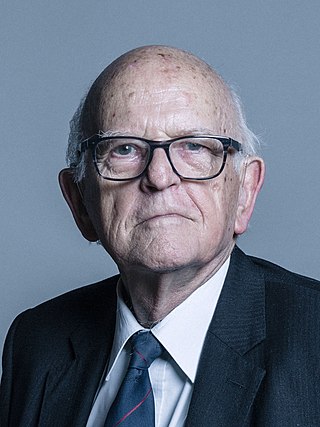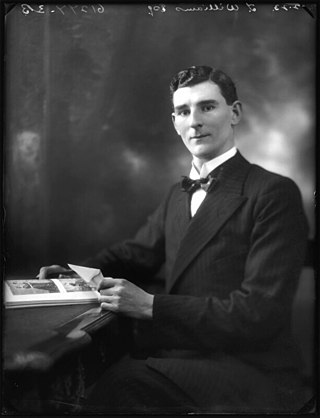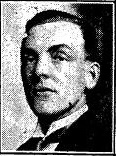Related Research Articles

William Shepherd Morrison, 1st Viscount Dunrossil,, was a British politician. He was a long-serving cabinet minister before serving as Speaker of the House of Commons from 1951 to 1959. He was then appointed as the 14th Governor-General of Australia, in office from 1960 until his death in 1961.

Sir Cuthbert Morley Headlam, 1st Baronet, was a British Conservative politician.

Sir Frederic Mackarness Bennett was a British journalist, author, barrister and Conservative politician who served as a Member of Parliament for 35 years. He was appointed a Privy Counsellor in 1985, and a Deputy Lieutenant for Greater London in 1990. He was also Lord of the manor of Mawddwy in Wales.

Frank Ashcroft Judd, Baron Judd, was a British Labour politician. He was a Senior Fellow of Saferworld NGO from 1994 to 2002, and from 2002 to 2015, a trustee. In 2007, he became a member of the advisory board at the Centre for Human Rights, and from 2014 to 2015, a member of the Commission on Diplomacy, at the London School of Economics. He was a member of the Unite and GMB trade unions.
Wednesbury was a borough constituency in England's Black Country which returned one Member of Parliament (MP) to the House of Commons of the Parliament of the United Kingdom from 1868 until it was abolished for the February 1974 general election.
Sir Robert Donald Scott was a British Conservative Party politician.
Oldbury and Halesowen was a parliamentary constituency in the West Midlands, which returned one Member of Parliament (MP) to the House of Commons of the Parliament of the United Kingdom from 1950 until it was abolished for the February 1974 general election.

George Samuel Lindgren, Baron Lindgren, JP, DL was a British Labour Party politician.
John Dugdale was a British newspaper journalist and politician. Well-connected with the Labour Party establishment, he worked as Private Secretary to Clement Attlee and was appointed a Minister in his post-war government.

Thomas Williams, Baron Williams of Barnburgh, PC was a British coal miner who became a Labour Party politician.
The 1940 Kettering by-election was a parliamentary by-election held on 6 March 1940 for the British House of Commons constituency of Kettering in Northamptonshire.
Brigadier Sir Otho Leslie Prior-Palmer, DSO was an Anglo-Irish British Army officer and Conservative Party politician. He served for nearly twenty years as a Member of Parliament for Worthing. His main contributions were on the subject of defence, on which he was sometimes roused to outspoken criticism of the opposition Labour Party.

Arthur Moyle, Baron Moyle, CBE was a British bricklayer, trade union official and politician. As a member of parliament for nineteen years, he was principally known for serving as Parliamentary Private Secretary to Clement Attlee during Attlee's Premiership. He was also perennially lucky in the ballot for Private Member's Bills.
Donald McIntosh Johnson was a British general practitioner, author and politician who was a member of parliament for nine years. He regarded himself as a 'Cassandra', and he was described by one observer as "an eccentric man of considerable personal charm and egotistical obstinacy" who had failed to prove it was possible to be both a Conservative and Independent MP at the same time.
Sir Hugh Nicholas Linstead OBE was a British pharmaceutical chemist and barrister who served as Conservative Party Member of Parliament (MP) for Putney for 22 years. Linstead had significant business interests in the pharmaceutical industry. His politics were on the moderate side of the Conservative Party and he was a strong supporter of the National Health Service.

Sir James Henderson-Stewart, 1st Baronet, born James Henderson Stewart, was a British banker, Army officer and politician. He was a National Liberal Member of Parliament for East Fife from 1933 until his death, and was the sessional chairman of the Parliamentary Party in 1945. He played an important role in negotiating the unity of the National Liberals with the Conservatives, but was unable to persuade the Liberal Party to join as well.
The National Liberal Party, known until 1948 as the Liberal National Party, was a liberal political party in the United Kingdom from 1931 to 1968. It broke away from the Liberal Party on the issue of abandoning Free trade and supporting protectionism, and later co-operated and merged with the Conservative Party.

Herbert Stanley Morrison, Baron Morrison of Lambeth, was a British politician who held a variety of senior positions in the Cabinet as a member of the Labour Party. During the inter-war period, he was Minister of Transport during the Second MacDonald ministry, then after losing his parliamentary seat in the 1931 general election, he became Leader of the London County Council in the 1930s. After returning to the Commons, he was defeated by Clement Attlee in the 1935 Labour Party leadership election but later acted as Home Secretary in the wartime coalition.
The 1964 Dissolution Honours were officially announced on 27 November 1964 and marked the dissolution of parliament following the 1964 General Election.
References
- ↑ Who Was Who, Volume V: 1951–1960 (Charles Black, London, 1961)
- ↑ "The city of Cambridge: Parliamentary representation Pages 68-76 A History of the County of Cambridge and the Isle of Ely: Volume 3, the City and University of Cambridge". British History Online. Victoria County History, 1959. Retrieved 26 December 2022.
- ↑ Who Was Who, Volume V: 1951–1960 (Charles Black, London, 1961)
- Craig, F. W. S. (1983) [1969]. British parliamentary election results 1918–1949 (3rd ed.). Chichester: Parliamentary Research Services. ISBN 0-900178-06-X.
- Leigh Rayment's Historical List of MPs